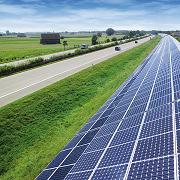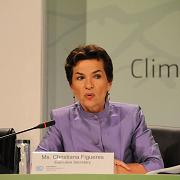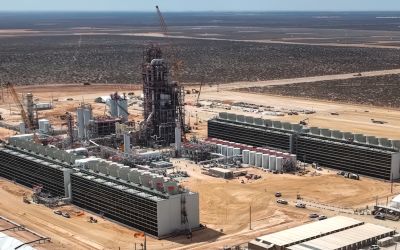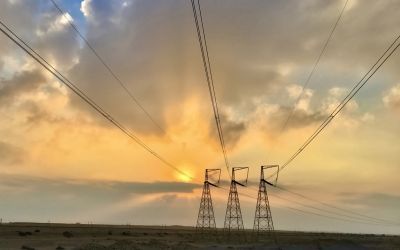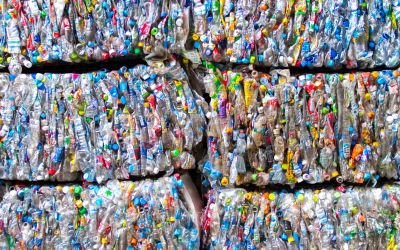Securing Tomorrow’s Energy Today: WEC Secretary General Dr Christoph Frei
Secretary General of the World Energy Council, Dr Frei, discussed the upcoming World Energy Congress and the UN’s Sustainable Energy for All initiative with Climate Action

Formed in 1923, the World Energy Council is the UN-accredited global energy body, representing the entire energy spectrum, with more than 3,000 member organisations located in over 90 countries and drawn from governments, private and state corporations, academia, NGOs and energy-related stakeholders.
Dr. Christoph Frei of the World Economic Forum became the fifth WEC Secretary General in April 2009 and he spoke to Climate Action about the upcoming World Energy Congress in Daegu, the United Nations Sustainable Energy For All initiatve and the WEC's presence at the Conference of Parties in Warsaw late this year.
The theme for the upcoming World Energy Congress is ‘Securing Tomorrow’s Energy Today’. Could you tell us a bit more about the key challenges with achieving energy security and what the hot topics will be at the Congress?
In my view, the goal of working towards a world where energy supplies are inherently more secure, can be achieved only by achieving a combination of objectives. Sustainability and diversity are at the heart of this goal, coupled with the need for greater efficiency and a net reduction in global greenhouse gas emissions. As the world’s energy demand grows across global markets, and continues to outstrip supply, the theme of the Congress ‘Securing Tomorrow’s Energy Today’ could not be more pertinent.
"Discussing how close we are to grid parity and technology for energy storage levels are real issues that will help us plan for the future"
Among the ‘hot topics’ at Congress, I am looking forward to the in-depth analysis of various energy sources as well as the right policies and best business models to deliver them.
Energy security is a driver behind the adoption of renewables in many territories; for example, high oil prices mean countries have to think strategically about a longer term picture that encompasses a higher number of sources and technologies. It’s no longer a “nice to have”, but proper diversity has become a requirement to ensure resilience of energy infrastructure.
Exploring the opportunities and risks around untapped hydro, discussing how close we are to grid parity and technology for energy storage levels are real issues that will help us plan for the future. Achieve the right mix around the world, and more sustainable supplies will follow.
Access to energy in developing countries, especially electricity, has been a prominent topic for some time. What are the main inhibitors to making energy accessible to populations in developing countries and what plans are in place to combat these?
.JPG)
Globally over 1.2 billion people (one of every five people on earth) do not have access to electricity, and 2.7 billion people (40% of the global population) are without clean cooking facilities. Over 80% are in rural areas of the developing world.
The Millennium Development Goals (MDGs) were set out to fight world poverty, but energy was not included as one of the goals when they were first defined 20 years ago. Discussion of global poverty must include energy because none of the MDGs can be delivered without it. But fortunately, this is changing for the better. With his Sustainable Energy for All initiative, the UN Secretary General Ban Ki-Moon has been mobilising efforts to remind all of us that access to energy is the “golden thread” to sustainable development. Much more still needs to be done, but energy now placed much more firmly on the development agenda– and this is significant.
There is no simple solution to universal energy access because it is a multi-faceted problem with a number of interdependent challenges. However, the key must lay in a dynamic private sector that sees the lack of electricity as a business opportunity and is supported in developing this opportunity by the right enabling frameworks. In order to tackle these challenges, it is essential to understand the issues topping the world’s energy agenda and the different regional priorities.
Each country needs to find its own way of balancing the trade-offs between the three dimensions of the ‘energy trilemma’ to ensure security of supply, affordability of prices, and respect for the environment.
Grid parity and the continued breakthrough of renewables will also be addressed in Daegu. Could you tell us more about the prospect of grid parity and what are the key inhibitors to achieving that?
Grid parity has become something of a buzzword in the energy community. 2012 was not a vintage year for renewables and as the global recession impacted on subsidy schemes and investments, confidence on the longer term perspective suffered.
Over the past five years we have seen the largest cost declines in renewables history. However, in order to deliver renewable electricity to the consumer at the time when he needs it to cook a meal, cool or light a room, the availability of storage is critical. Unfortunately, the need for storage is an important part of the overall induced system cost of renewables and the cost of storage is lowering at very modest rates only. As renewable energy sources typically provide electricity during 15-30% of the time only, the induced storage costs are much greater than for conventional energies with availabilities often greater than 80-90%. Increasingly large shares of renewables in the system therefore generate large system costs, the weight of which starts affecting overall electricity prices and energy security in countries with large renewables shares such as Germany (pictured right).
It is interesting to note that more and more renewable energies have shifted to developing countries. This is good for two reasons: their locations are often better suited to renewable production (e.g. cheaper land and better access to sunshine for solar); and second, there is less budgetary support and the technology therefore must be more efficient to succeed. In some cases, e.g. when in Saudi Arabia the need for cooling falls together with the peak of solar production, the storage requirements are of much lower importance.
Another important aspect to consider is that costs across renewable technologies still greatly vary and that subsidies are often blind with regards to availability to wind or sun. In the interest of electricity affordability it must be in the interest of every government and consumer that lowest cost technologies are deployed. Using the levelised cost of energy as a decision basis thereby helps to increase renewables shares at lowest possible cost. Without it, along with a fuller understanding of the financial requirements involved, grid parity will remain an intangible objective on the horizon.
The World Energy Council is undertaking a study of the ‘Cost of Energy Technologies’ with our project partner Bloomberg New Energy Finance. This work is analysing the entire range of energy technologies, from traditional fossil fuel sources to the latest renewable energy developments, in order to identify and fully understand actual costs.
The preliminary report of the study, on renewable energy technologies, will be officially released and discussed at Congress this October, and will add significantly to the debate surrounding the best technologies to deliver the global energy transformation.
The Council has supported the Global Tracking Framework report on the UN’s Sustainable Energy for All initiative. How has the Council been involved with the initiative and what benefits has it brought? A plenary panel session on October 17 at the Congress will address SE4ALL. Could you tell us more about the session?
The World Energy Council has been a UN-accredited body since 1954 and holds a special consultative status on energy.
Starting at the Clean Energy Ministerial in April 2012, I personally had the opportunity to represent WEC advising the UN Sustainable Energy for All initiative’s High-Level Group. This recognised the need for a set of baselines against which we can track the global progress on meeting the goals of the SE4ALL initiative. It was the idea for the Global Tracking Framework and the Council has played a key role in its compilation.
"The goals of SE4ALL and WEC are aligned and we are pushing in the same direction"
The goals of SE4ALL and WEC are aligned and we are pushing in the same direction. The Council is committed to playing a part, guiding policy through our leadership network. Sustainable energy issues such as access, efficiency and renewable sourcing are at the heart of what we do and the fact that energy is now a key enabler for development is a major outcome of the SE4ALL initiative. In addition to the three SE4All objectives, WEC with its Trilemma also explicitly support the reduction of greenhouse gas emissions.
We were among 15 agencies involved in the report’s compilation and our platform and network have been used for the launching of the methodology and findings. The report provides a baseline to enable the success of the UN SE4ALL initiative to be tracked. I am pleased to see that the report shows there has been good progress, but it is also clear that much more will need to be done if we are to meet the UN Secretary General’s ambitious goals.
We have also prepared a special day at the forthcoming World Energy Congressdedicated to SE4ALL and the follow up process, with sessions chaired by Kandeh Yumkella, the CEO of the initiative. With that we will help further increase awareness of SE4ALL in the private sector and explore business opportunities and enabling frameworks. SE4ALL is not just about country action but concerted global action from all fronts, with the private sector as a critical actor.
You have initiated projects including EPFL’s Roundtable on Sustainable Biofuels, and sustainable biofuel projects will form a part of discussions in Daegu. What are the crucial factors to successful biofuel projects and how vital will these be in securing tomorrows energy?
What is valid for any technology is also true for biofuels: There is no bad technology – only bad technology management. Using scarce land or water resources that directly and negatively affect the availability of food or drinking water simply doesn’t make sense. Providing subsidies to encourage such patterns must be banned. However, biofuels can make great business and ecological sense in areas where water and land are abundant or in applications where alternatives to liquid fuels are extremely difficult to realize – such as aviation.

I personally believe that the ‘energy water food nexus’ debate is absolutely critical and will deeply affect the future of our energy infrastructure. They exist not just around biofuels but around many energy issues such as hydraulic fracturing (“fracking”) for shale gas, the future of large hydro, the mining of coal or even the cooling of nuclear or thermal power plants. The problem is that water evokes feelings of high emotion in people. This can polarize public opinion which then results in dangerous one dimensional ‘all or nothing’ statements.
In 2010 the World Energy Council produced an important report ‘Water for Energy’ in which we discussed the changing demands on water resources throughout the world. It highlighted for example, the competing natures of food and agriculture, with energy where water is concerned. It also highlighted the competing uses of biofuels for food and fuel production.Climate change adaptation and mitigation policies require ‘water for energy’ and ‘energy for water’ challenges to be considered in parallel. Our latest Scenarios also looks at this issue as a critical driver.
The most important issue to keep in mind with regards to biofuels is: global statements are missing the point as water and land availability are always local. What may be perfectly sustainable in one place may be a total aberration in another.
Could you expand on the Energy Trilemma and how a green growth agenda is gaining the confidence of investors?
The WEC’s World Energy Trilemma looks at the enormous challenges facing our world from three perspectives: energy security, social equity and the mitigation of environmental impact. This is an urgent call to action because we are facing the prospect of global energy demand doubling, the need to reduce emissions by 50% and enabling electricity access for the 1.2 billion currently unconnected to the grid.
"The green growth agenda is inextricably linked to addressing the Energy Trilemma"
Our World Energy Trilemma Report, now in its fifth year, is aimed at business and policy decision makers and is based upon views from both industry and government on actions that are required. In our 2012 report, based on the views of industry, industry leaders found that having a robust and coherent policy framework was crucial to getting the investment we need in delivering sustainable energy for all. In this year’s report, we will hear from policymakers on what they expect from industry and business in order to deliver on sustainable energy goals. At the Congress, we will bring together all the findings and work out the implications.
In answer to the second part of your question, the green growth agenda is inextricably linked to addressing the Energy Trilemma. Political risk is often referred to as major barrier for energy infrastructure projects to be financed. With our Trilemma approach we provide a tool that helps countries balance the main dimensions of energy policy and therefore mitigate each country’s political risk. Money is shy and will prefer countries with a low political risk. Attracting investments is critical for every single country in a time when the world needs to invest the equivalent amount of half a world GDP over the next two decades in energy infrastructure.
An increasing number of countries have started using the Trilemma as a reference against which they benchmark their energy policy. Government ministers, development banks and institutional investors will come to the Congress to provide their own feedback on how they use the Trilemma. At WEC we have been investing in the Trilemma for the past five years as the backbone for the discussion among investors, governments and energy companies on the sustainable future energy infrastructure and the Congress will allow us to take this discussion to the next level.
Coming just a month before the COP19 negotiations in Poland, what conclusions are you hoping will be drawn from the Congress?
The World Energy Council’s mission is to inspire Energy Leaders, including energy ministers, investors, and top executives from utilities, oil & natural gas companies, energy technology manufacturers and construction companies, and provide them with a neutral platform for dialogue and consensus building on critical issues within the Energy Trilemma.
"The Congress will play a significant role in shaping the thinking of energy leaders and forge partnerships among them"
We are not a policy governance body but the Congress will play a significant role in shaping the thinking of energy leaders and forge partnerships among them based on the insights produced by WEC. Energy Leaders, according to WEC’s Energy Issues Monitor, view climate change as the number one “keep me awake at night” issue.Our World Energy Scenarios and Issues Monitor lay out the risks and critical uncertainties; our World Energy Trilemma and World Energy Resources work provide Energy Leaders with the necessary insights to take informed and better decisions.
WEC stands for the World Energy Trilemma and it is our objective to further increase the number of governments and investors who use WEC’s Trilemma as a structured process towards the delivery of a sustainable energy infrastructure. With that in mind we have for the first time expanded the number of countries of the Trilemma ranking beyond our membership to 130 countries this year.
Could you tell us a bit about the Council’s planned activities for the COP meeting in November in Warsaw?
The uncertainty over issues such as a carbon price creates an atmosphere of huge political risk and fear of stranded investments. The issue of the future of a carbon price signal needs to be clarified if we are to have any hope of delivering the massive transformation that is needed.
This is why WEC will this year again support the UNFCCC process by presenting our work at COP19 in Warsaw. Christiana Figueres (pictured right), Executive Secretary of the UNFCCC, will take part into the Clean Energy Without Borders plenary and will bring back to the COP19 process the outcomes of the World Energy Congress 2013.
WEC will also be presenting at COP our work around World Energy Scenarios to 2050 to help decision makers assess the options that they have in the near future if they want energy to play a key role in the mitigation of climate change. The World Energy Trilemma work will provide a clear message on how policymakers and industry can take clear actions for energy policies to drive change and investment and business to deliver the infrastructure and innovation needed for a clean, affordable and secure energy future.
WEC is looking to play its part within the COP19 negotiations with high level roundtables and events in conjunction with other key actors of the energy and development scene.
But most importantly: WEC invites all countries to use WEC’s Trilemma approach to balance critical energy issues and mitigate political risk, thereby attract the needed investments and deliver the desired sustainable energy infrastructure that we all need and want.

